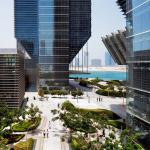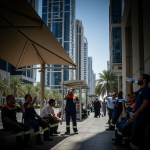Dubai – For Azeem and his family, their apartment near Deira Twin Towers has been more than just a place to live. They have called it home for over 25 years, watching their children grow up there and running their business just a few streets away. But in recent years, life in the building has become increasingly difficult because of illegal room-sharing practices and overcrowding.
“There are flats where more than 35 people live together,” Azeem said. “This building used to be very popular. The rooms are big, it has the charm of old Dubai, and everything we need is close by. But after Covid-19, things changed. Many flats were divided into small partitions, and now some of them house over 30 people.”
Azeem explained that residents have complained many times to the building management, but the problem continues. To try and control the situation, the building installed an access system where each apartment gets only three entry cards. This has created new problems.
“When we have guests, they often have to wait outside the main entrance until someone exits and can let them in,” said Azeem. “It’s embarrassing, and it makes us feel like we don’t have proper control over our own home.”
Daily struggles: long waits for the lift
One of the biggest challenges of living in an overcrowded building is using the elevator. Azeem shared that sometimes they have to wait 10 to 15 minutes for the lift because it stops on every floor due to the high number of people living in the building.
“The building was never meant for this many residents,” he said. Despite these struggles, Azeem’s family continues to stay because they feel emotionally connected to the neighbourhood. “We can’t imagine starting over somewhere else. Everything we need is nearby, and we’ve been here for so long.”
Overflowing buildings and rising tensions
In another building in Deira, residents face similar problems. One resident shared that the overcrowding has led to more fights and noise, as well as hygiene issues. “There’s garbage dumped in the stairways and corridors,” the resident said. “The smell is terrible in some areas, and it doesn’t feel safe anymore, especially for our kids.”
Once known as a good residential building, it has now become a source of stress. “People smoke and drink in the corridors. We often argue with neighbours over loud music. We really hope authorities bring stricter rules about partition walls and bed-space rentals,” the resident added.
‘Feels like a hostel now’
Families in a building near Union Metro Station also described the stress of living alongside large groups of unrelated tenants. Hiba (name changed), a mother of two, said their once-quiet building now feels chaotic.
“Our neighbours play loud music late at night, talk loudly in the hallways, and sometimes do things we don’t want our children to see,” she said. “My kids wake up at night because of the noise. I’ve tried to talk to them, but nothing changes.”
Her husband added that the atmosphere makes guests uncomfortable. “People stand around in the corridors at all hours. It doesn’t feel like a family building anymore; it feels more like a hostel.”
Landlords and partition operators
Several residents believe that some landlords are also part of the problem. Instead of renting directly to families, they rent entire flats to agents or tenants who subdivide them into smaller units and rent out each bed space.
“It’s not always done secretly,” said Naveen, a resident of Deira. “Some landlords know exactly what’s happening. A 2-bedroom flat gets divided into 8–10 small cubicles, and each cubicle is rented to multiple people. The landlord earns Dh8,000 to Dh10,000 instead of Dh6,000 from a single family.”
Residents say this practice directly causes overcrowding, noise, and sanitation issues, and they are urging the authorities to strictly monitor how flats are leased.
For many long-term residents, the solution isn’t just to move out. Instead, they hope for better regulation to bring back the safe, family-friendly environment they once enjoyed.










